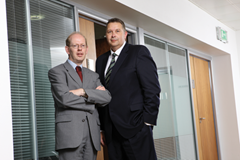Delivering change for the better: Paul Terrington
 PwC sees lacklustre economic growth for 2011 in Northern Ireland. Owen McQuade met with new Regional Chairman Paul Terrington, and Chief Economist in Northern Ireland Esmond Birnie, in the midst of the recent stock market crisis to discuss how to rebalance the local economy.
PwC sees lacklustre economic growth for 2011 in Northern Ireland. Owen McQuade met with new Regional Chairman Paul Terrington, and Chief Economist in Northern Ireland Esmond Birnie, in the midst of the recent stock market crisis to discuss how to rebalance the local economy.
PwC has just marked down its Northern Ireland growth figure for 2011 to a “lacklustre” 0.8 per cent. It still forecasts a growth figure of 1.6 per cent for next year but this is more of a case of waiting to see the full extent of the recent slowdown in the global economy before revising the 2012 growth figure.
“The reality is that hitherto we have had the luxury of a poorly performing economy with relatively high levels of public expenditure which has grown continually over the last number of years.”
“We are now at a point where we actually have to do something,” observes Esmond Birnie.
Birnie, the former MLA and ministerial adviser who is PwC’s Chief Economist in Northern Ireland, sees two major stress points for the local economy: “Our two biggest external markets, GB and the Republic of Ireland, both face major difficulties. The Republic’s recession has probably cut half a percentage point off Northern Ireland’s growth in recent years.”
“An extremely slow recovery, well under 1 per cent [growth], and it may be persistent at that level for some time,” says Birnie looking to the future.
Paul Terrington sees the way out of the current economic malaise through export-led growth: “If we are looking for any hope it has to be in terms of exporting outside of the UK and Ireland and the Eurozone.”
Another reason for the firm’s caution is that bank lending in the UK slowed significantly in June of this year, with the banks perhaps foreseeing some of the difficulties in the Eurozone. This restriction in lending will impact on the manufacturing sector which needs lending to fund output and investment in plant.
Terrington highlights a problem that is particularly acute in the local economy: “There are a lot of fundamentally sound businesses who have exposure to property debt; that has hit their prospect of attracting any lending. Many of these companies have potential for exporting and helping grow the local economy. This is really an acute issue that we need to tackle with a Nama-type approach.”
Another part of the equation for tackling such issues driving the economic downturn is political leadership. “It is about being creative and not just cutting public expenditure.”
“We have been slow to produce a new Programme for Government, compared to other parts of the UK and Ireland, where in advance of coming into power there was a clear and coherent programme,” adds Terrington.
There has been much research published on the issue of rebalancing the economy and the impact of lower corporation tax. Birnie sees the way forward as one of three ways: “Plan A: a Nordic collaborative approach to society with high rates of R&D spend. There is no way we are going to get there anytime soon. Plan B (which is the PwC view): with a lower headline rate of corporation tax in the context of a wider fiscal package of business tax incentives. Plan C: a corporation tax reduction by itself, a ‘nice to have’ but not sufficient alone.”
Terrington emphasises the PwC view on reducing corporation tax in Northern Ireland, which he says has often been misunderstood: “PwC is not opposed to a reduction in corporation tax. In fact, we are in the camp that supports 12.5 per cent and think that it is a good thing for the local economy. But if we think that is the only panacea or solution to our economic ills then we are wrong.”
“A range of tax-varying powers, particularly around R&D, are the key incentives for business growth,” says Terrington.
Jobs
Birnie observes that there has been an understandable “fixation with jobs” in the past: “We have been very good at this over the past decade but these have been low value added jobs.” He goes on to say that if you compare the main economic drivers between 1998 and 2008, the only things to have increased were the absolute number of people in employment and the average household income “that only went up very modestly.”
During this period the key measures which determine the long-term competitiveness of the local economy, such as GVA per capita and productivity compared to the UK average, went in the wrong direction. “The goal should be high GVA jobs that are very productive and contribute to exports, that are created and sustained through R&D and innovation. That has been the Irish model and is likely to be the Scottish model if Scotland reduces corporation tax,” observes Terrington.
“It is about productivity driven by R&D and innovation which creates long-term high value sustainable employment,” he adds.
“There have been 15 reports and strategic reviews of the Northern Ireland economy, all of which have concluded that improving productivity is the key to long- term sustainable economic development and that needs to be the focus for the Programme for Government,” emphasises Terrington.
When asked, from PwC’s perspective across its clients, what sectors the recovery will come from, the reply is “parts of manufacturing, that are exporting to distant markets; tradable services; and key sectors like tourism where there is clear potential.”
Focusing on the challenges of exporting tradable services Terrington highlights his own firm’s performance in this key area, with 40-45 per cent of revenues from outside Northern Ireland.
“We are still able to create a good calibre of person at a competitive remuneration package. We are not looking for low cost individuals but competitive ones.”
When asked how PwC has grown this level of exports, he replies: “The leadership of the business has to be committed to going out and winning that work. In truth, you can’t do this sitting in your office in Belfast.”
“You need to focus on areas where we can bring a niche expertise which can be leveraged to a broader base. For example our research and survey capability, which is branded as a global offering. We have people selling these services in New York, London and the Middle East.”
When asked about the challenges in exporting services from Northern Ireland, Terrington replies: “Don’t appear peripheral. Get out and sell your services. You have to build relationships and deliver to the required level.”
“Another factor is being ambitious enough; not being satisfied and always looking for the next job. And even if you can deliver the service from here, you still have to get on a plane to sell and build relationships.”
“We are following our own advice,” quips Terrington. “We tell clients to export and we are doing it ourselves.”
This was reflected in this year’s PwC staff conference which included a “planes, trains and automobiles” session with tales of the resourcefulness of the PwC consultants and partners in managing to get home in spite of the snow and ash clouds.
“There is also a great sense of pride in our overseas work, with a good connection back to the office in Northern Ireland,” adds Terrington.
World economy
According to Birnie, the world economy is now the big worry for the local economy: “The US has its problems coupled with the Eurozone difficulties. The NI economy is a small bit player with a lot of givens.”
When asked ‘what can we do?’ against such a gloomy backdrop, the discussion moves onto rebalancing the local economy.
“The public-private interface is critical to any rebalancing. It’s not just about privatisation, taking things from public to private. Other things need to be considered such as mutualisation, whereby you can bring a private sector approach without selling off the family silver,” says Terrington.
“Collaboration between the private sector and government has a key part to play,” he adds and he sees an opportunity around local government reform whereby collaboration on shared services could be leveraged to bring in other investment.
On the wider issue of public sector reform, he sees the need to be radical and constantly ask: “Why do we need to do it this way?” On the Review of Public Administration he sees a missed opportunity for the local economy: “RPA started well but then stalled and the opportunity not just to cut costs but transform local government and education was lost.”
In terms of shared services the Northern Ireland Civil Service has been “ahead of the game” and the challenge now is to extend these to other services and to look at other commercial opportunities with this “big successful investment”.
Programme for Government
The last Programme for Government (PfG) put the economy as its main priority but Terrington and Birnie both see some room for improvement when drafting the next PfG. The previous programme had around 330 individual targets. Birnie suggests a smaller number would be better, particularly in relation to the key economic indicators. Many of these indicators were process-driven. For example ‘set up a committee, commission a review’. In the case of productivity growth, about two-thirds of the 27 chosen targets appear to indicate progress and yet the available forecasting evidence suggests that Northern Ireland is adrift from its goal to achieve convergence with the rest of the UK.
Terrington contrasts this with the Irish and Scottish PfGs which have clear unambiguous “recognition events”, with a strong focus on outcomes rather than processes (including, in the case of Dublin, things to do “in the first 100 days” of the new coalition).
 “If you look at the shape of the PfG it needs to have clear unambiguous outcomes, be locked into the economy and have measureable performance indicators and, above all, the political will to set challenging targets.”
“If you look at the shape of the PfG it needs to have clear unambiguous outcomes, be locked into the economy and have measureable performance indicators and, above all, the political will to set challenging targets.”
“In addition we need to bring a philosophy that we are prepared to undertake radical change.”
Profile: Paul Terrington
Paul Terrington is Northern Ireland Regional Chairman and leads PwC’s People and Change practice across the UK. He has led the Advisory practice locally for the last four years and before that was 15 years in the firm’s consulting practice where he was the lead partner of HR and organisational development projects.
Paul has been involved in several large transformational projects, including
the NICS HR Shared Services project. He sees the main challenge for such large projects as “getting the decision to undertake radical changes, which takes a lot of political will and convergence.” Once you embark on such projects “it’s important to align the people and to focus on the benefits of the project”.
Belfast-born, Paul is married with a five year old daughter. His interests focus on sport, being recently retired from playing for Academy Rugby Club and is a season ticket holder for North London club Spurs, which has been “a character forming experience, over the years.”







